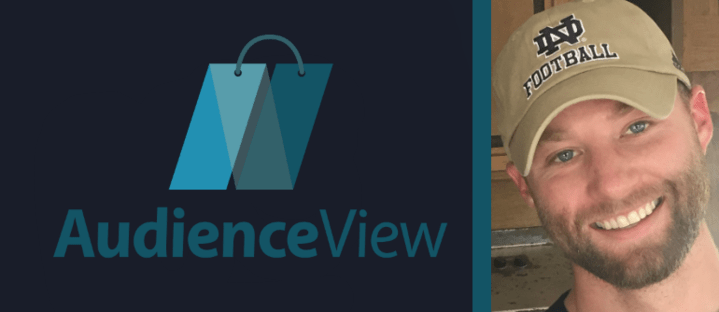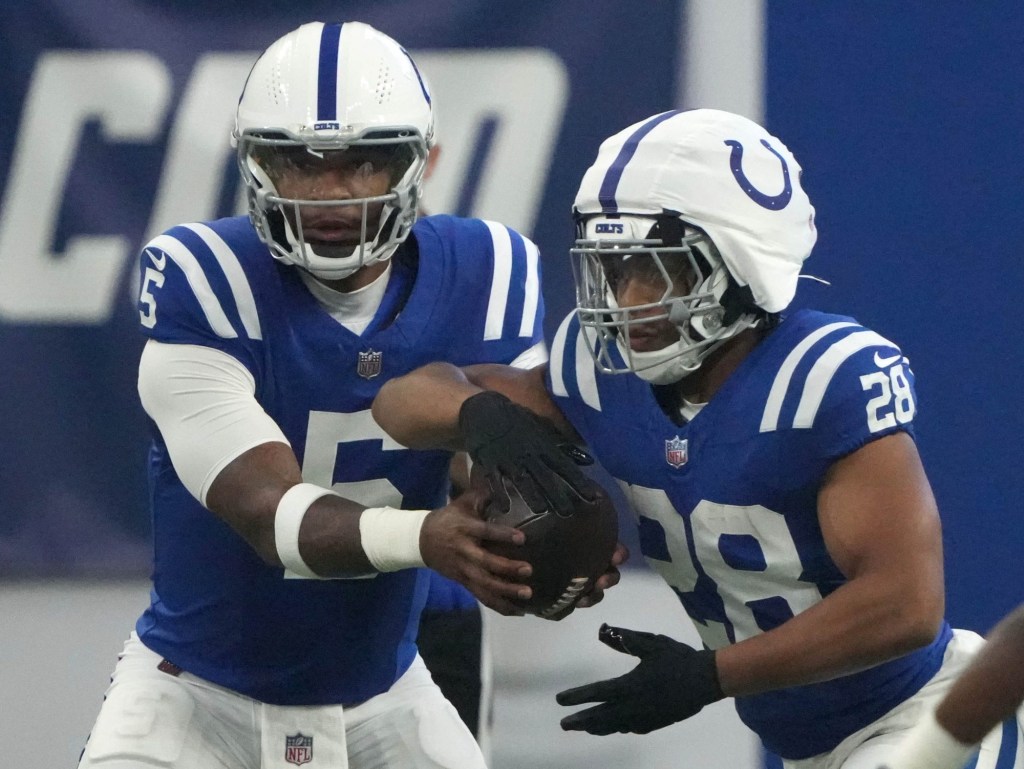AudienceView’s Connor Kruggel talks about his career path, the future of fan experience, and more.

Connor Kruggel knows how to close. As an eager sports marketing student at the University of Indiana, Kruggel would sell himself to industry professionals that would cycle through the program with the hopes of landing internships and resume-building jobs that would separate him from his peers.
“I got involved in as many internships as possible while in school,” Kruggel reflects. “Indiana always encouraged real-world experience and networking. The Hoosier Sports Business Organization, which is a student-run group, brought industry speakers and networking events to campus.”
With some internships in his hip pocket, Kruggel would go onto parlay the foundation of experiences he had sculpted into a job as an inside sales representative with the Columbus Blue Jackets that would serve as a launchpad for the rest of his career.
“I always tell people ticket sales is the best thing I have done in my career because it taught me how to communicate well and handle rejection. My interest in the ticketing side of the business grew while I was in Columbus. I became fascinated with ticketing technology and the journey from the sale of a ticket to the fan in their seat.”
Most students that want to work in sports are told that sales are perhaps the easiest point of access for “getting your foot in the door,” so Kruggel’s affinity for the ticketing sector was his calling card as he became a player in the job market. With his passions pinpointed, he obtained an internship with the University of Notre Dame athletic department that would enhance his network and add more skills to his utility belt.
“Notre Dame was my, ‘So you want to work in the sports industry?’ moment. So much goes into putting on events, home or away, for an institution like Notre Dame. Long work weeks of 65 to 70 hours are the norm. My year there was really special because I grew up in South Bend, have family that attended the university, and I’m a lifelong fan. Notre Dame opened so many doors for me professionally, but it’s not necessarily because of the Notre Dame brand — it’s because the people I worked with cared about my professional development.”
After his time in South Bend concluded, Kruggel set his sights on a full-time gig with the Air Force athletic department where he began his tenure as an Assistant Ticket Manager. Thanks to the assortment of experiences he now had at his disposal, Kruggel would rise quickly, eventually being named the Director of Ticket Operations. With a new title came new responsibilities, and Kruggel found himself right in the middle of managing a group — an adjustment for anyone on the rise.
Customer service is paramount in the world of ticket operations — temperament is often tested, on the spot problem-solving is an assumed trait, and whether they like it or not, those that call the ticket office home are viewed as the gateway to the rest of the organization.
“The ticket office is always the front door of the athletic department. From phone calls to in-person interactions with fans and donors, your behavior will often help form a fan’s impression of your entire organization. Represent yourself as if you are the athletic director or the president of the organization because every member of a team is equally important to its success.
“As an example, I experienced a bit of a hurdle at Air Force when we renovated the club area of the football stadium. Construction was taking place right down to the night before the home opener and the seats were not installed correctly. I had to tape people’s names to each individual seat and relocate others so there was no confusion on game day. We also had to draft and send an email to ticket holders explaining the situation. All the hard work that goes into problem-solving gives you a rewarding feeling on game day when fans are enjoying themselves.”
After directing ticket operations, Kruggel was soon presented with the opportunity to become the Assistant Athletic Director of Ticket Operations and Premium Seating at Air Force. Reaching the heights of having “athletic director” in your job title is no small feat, but is thought to require a macro and micro mindset. Kruggel was the voice of direction for the Air Force ticket department, and with that came an ethos for leadership.
“Leading by example is important to me. Remaining involved with your staff and understanding your full operations on the front lines — such as assisting with window sales, stuffing invoices, organizing will call, etc. — is important. Additionally, understanding each staff member personally and knowing what motivates them is imperative to success. Managing tasks to individual strengths of staff members makes a team incredibly productive.”
Comprehending an individual’s strengths is an essential cog in any leader’s pathway to galvanizing a group, and Kruggel is a great example of a boss that looks to achieve just that. As any professional in the ticketing world would know, maximization is king.
As time went on, Kruggel grew evermore fascinated with the technology that lies behind ticketing software and analyzing consumer behavior. With an influx of technological advances over the last decade, there is a thirst in the industry for efficient minds capable of mining through data. After learning more about that side of the industry, Kruggel linked up with AudienceView, a company that emphasizes engagement, increasing revenue, and saving time.
“I knew that working on the platform/system side was where my career path needed to go and that AudienceView was the right place for me. AudienceView is a rapidly growing company with incredible technology that is changing the way the industry does business. It increases efficiency for the back office while offering an amazing experience for fans and donors.”
Now a Solution Specialist at AudienceView, Kruggel has a front row seat to what it’s like on the vendor side of the industry. With top of the line technologies at his disposal and a network of clients to tend to, he is focused on showing schools how AudienceView can be a driver in improving customer experiences and enhanced revenues.
“AudienceView allows organizations to collect fan-specific data and offers the flexibility to create unique offers tailored to a group of fans. While it seems like this should be easy for all schools, the underlying technology can be more limiting than it needs to be. With AudienceView, that’s not the case.
If one of our partner schools has an innovative idea, we will help them achieve it within the platform, not by bolting on other programs or products that don’t talk to each other. AudienceView also allows system users to have full control and have a system that works FOR them.”
It is an open secret that selling a ticket to a sporting event is far different than it was five or ten years ago. The industry is ever-changing, and someone in Kruggel’s position must be prepared to shift with the times and find the best path of pursuit to sustain an elite consumer experience. Season tickets may not elicit a fan’s desires as much as they once did, but as Kruggel explains, there are other avenues to explore to cater to the next generation of ticket buyers.
“The season ticket is dead. With so many options to consume an event and the difficulty to commit to an entire season, organizations need to adapt. Providing fans with an easy, on-demand way to purchase tickets as well as flexible subscription models and membership programs will start to be the norm.
“Additionally, the primary and secondary markets are finally merging. AudienceView includes an end-to-end integration that enables primary and secondary inventory to flow seamlessly and in real-time from AudienceView into the marketplace of its secondary partner. This allows AudienceView clients to bring new fans into their database that otherwise would not be identified. Athletic departments can then analyze these new fans and turn them into repeat buyers and donors.”
The future presents a flurry of unknows, but someone with Kruggel’s background and expertise, I find no reason why he won’t be a leader in deciphering the best way to marry the needs of clients and consumers going forward.
Speaking of the future, Kruggel has some wisdom to disperse to those looking to find their own niche in the high stakes industry of sport.
“Know where you want to go in the industry, so you can start to grow your career path prior to graduation. Do not pursue ticket sales to just “get an in.” If you want to work in media relations, be relentless in searching for an opportunity in that area, even if it is an unpaid internship. Get as much hands-on experience as you can while you are in school. When you graduate, real-world experience on your resume will separate you from the pack.
The sports industry network runs far and wide. Always remember, it is not what you know, but who you know. Everyone knows everyone! Your next job is likely to come from a former colleague who is moving up the ladder.”
This story was presented to you by AudienceView.
Front Office Sports is a leading multi-platform publication and industry resource that covers the intersection of business and sports.
Want to learn more, or have a story featured about you or your organization? Contact us today.

















